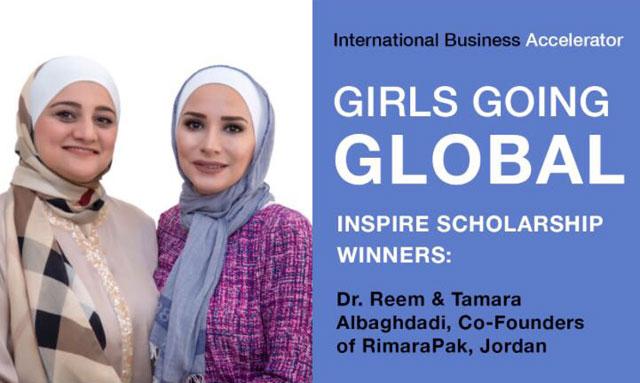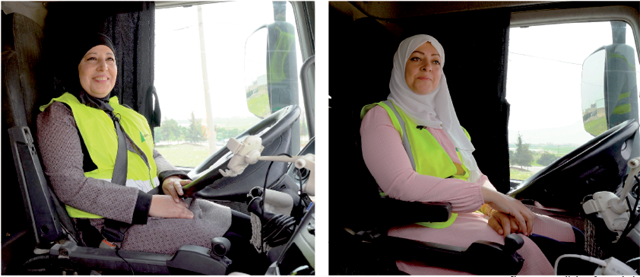You are here
Jordanian sisters win int’l business accelerator scholarship
By Ana V. Ibáñez Prieto - May 27,2018 - Last updated at May 27,2018

Tamara and Reem Al Baghdadi pose as winners of the Girls Going Global Inspire Scholarship to the International Business Accelerator (Photo courtesy of Tamara and Reem Al Baghdadi)
AMMAN — Jordanian sisters and businesswomen Tamara and Reem Al Baghdadi say they believe that women must be empowered in order to break the glass ceiling and achieve their goals in their country, “and we believe in the power of individual impact to make a change”.
The sisters have been selected as the winners of the Girls Going Global Inspire Scholarship to the International Business Accelerator (IBA), which provides “a pathway into fast-growing international markets for resilient working women across the world”.
Women from Australia, the US, China and Palestine compete for the accolade, aiming to seize the 12-month scholarship worth A$13,800 at the IBA and fast-track their international success, according to a statement by the organisers.
“We launched the Girls Going Global competition on International Women’s Day earlier this year to encourage and support more women to expand their businesses internationally. We did this because we know that there are a lot of women entrepreneurs around the world who want to make a bigger global impact and expand their business internationally, but face challenges in doing so when it comes to access to finance, family commitments and building a support network to guide them,” IBA founder Cynthia Dearin said in a press release.
The Baghdadi sisters are the co-founders of RimaraPak, a packaging and plastic factory established in Amman in 2005 and focused on the development of food-graded, recyclable and hygienic products.
“We built RimaraPak from the ground up with timely investments of our own successes back into expansions whether through machinery lines, product diversification or strategy enhancements,” Reem told The Jordan Times, recalling how they adapted their own philosophy into their business model “by focusing on employing local women, along with engaging with numerous local organisations aimed at women’s economic empowerment”.
“We have always strived to create a larger global impact through the expansion of our business,” Reem continued, explaining how “with persistence in pursuing our vision, we approached international professional organisations, such as Girls Going Global, to benefit from their experience and the support of their global minded entrepreneurs”.
“When Tamara and Reem applied for the Girls Going Global competition, their goal was to expand their business into international markets through exports,” Dearin recounted, noting that “they knew that Jordan had signed numerous international trade agreements to facilitate greater exports, and they could see the opportunity for RimaraPak to expand their reach throughout the Arab region and beyond”.
“We were inspired by Tamara and Reem’s story of how they achieved success in a typically male-dominated industry, in a region of the world where serious political and economic challenges make it all the more difficult to succeed in business,” Dearin remarked, elaborating on how the judges were “impressed by the sisters’ vision and determination to expand RimaraPak internationally, by the work they are already doing to support Jordanian women and by their desire to do more on both fronts”.
“It’s definitely not easy for a woman to break grounds in the male-dominated business industry,” Reem stressed, adding that “as women, we must overcome difficulties such as access to finance, adherence to family commitments and the lack of a guiding support network”.
Reem’s words echo the findings of a study released earlier this year by the Jordan Enterprise Development Corporation, which called for an increase in the support of the business culture among Jordanian women.
The lack of guarantees in the access to financial resources was the reason for most of the surveyed women not to start a business, according to the study, while 42 per cent reported fear of failure as the main reason preventing them from pursuing business.
The absence of functional incentives, such as maternity leave, healthcare, retirement and job security, were also among the most influential factors affecting the overall entrepreneurial activity in Jordan, according to the report.
“We must stop blaming the cultural and traditional beliefs for the lack of female engagement in employment in general,” member of local NGO SADAQA Sahar Aloul recently told The Jordan Times, stressing that “there are many other factors preventing women from becoming both employees and entrepreneurs, and we should recognise them and work hand in hand with the government to overcome them and create better working environments”.
Related Articles
AMMAN — Holcim Group, a Swiss-French multinational company that manufactures building materials, has launched a gender diversity progr
When the fledgling Transjordan Emirate was struggling with the first steps in its transformation into a modern state, the Ahliyyah School for Girls (ASG) was also doing its part: empowering Jordanian girls through education and knowledge.
AMMAN — Some 450 people on Saturday attended the launch event of the “Empowering Women through Cooking (EWC) — Jordan Cookbook”, a book cele


















